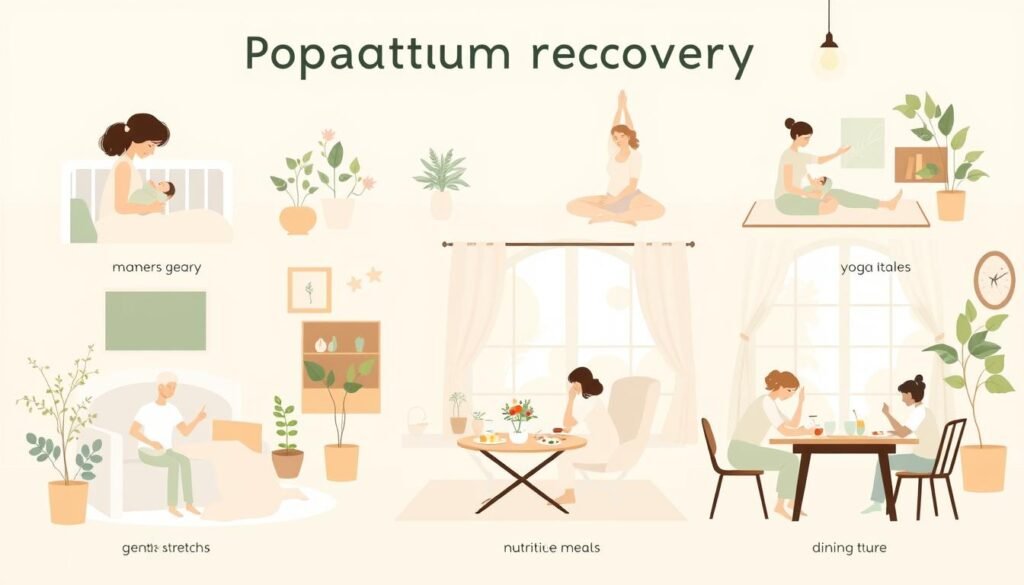It’s surprising that 75% of new moms feel extremely tired after giving birth. This fatigue makes it hard for them to connect with their babies. It’s a big challenge that often gets overlooked.
About 70-80% of new moms get really tired soon after their baby arrives. So, it’s clear that dealing with this tiredness is key to feeling better. It’s crucial for both their recovery and their happiness.
New moms have a lot on their plate. They’re taking care of their baby and trying to get better themselves. This guide will share helpful tips to fight this fatigue. Moms can feel more energetic by focusing on rest, eating well, and taking care of their emotions. This helps them enjoy time with their babies more.
Key Takeaways
- 75% of new mothers report experiencing postpartum fatigue.
- 70-80% of mothers experience exhaustion in the first few weeks postpartum.
- Understanding the causes of postpartum fatigue is crucial for effective management.
- Prioritizing rest and self-care can significantly improve energy levels.
- Seeking help from friends, family, or professional services can alleviate feelings of overwhelm.
- Engaging in light exercise, like walking, can enhance mood and energy.
- Maintaining proper hydration and nutrition is vital for recovery.
Understanding Postpartum Fatigue
Postpartum fatigue hits many new moms hard, leaving them really low on energy after having a baby. It’s defined as feeling so tired that normal day-to-day stuff gets hard to do. Moms report feeling totally drained, having trouble thinking, and feeling very stressed.
Definition and Symptoms
About 47% of new moms feel these fatigue symptoms, and the number is even higher in moms with less money. These symptoms include feeling physically tired and having a hard time concentrating, often called “mommy’s brain.” As they adjust to big life changes and take care of their newborn, they feel swamped. Most moms start feeling this way in the first ten days post-birth, and for some, it drags out for a month.
Common Experiences Among New Mothers
Many new moms find their sleeping patterns turned upside down, and they go through a lot of emotional ups and downs. They often talk about crying a lot and feeling pretty down. Hormonal shifts and the work of caring for a baby play a big part in this. It’s interesting to note that one year later, only 11% of moms still feel worn out. For moms who breastfeed, a hormone called prolactin makes them even sleepier, which can slow down their bounce back to feeling normal.
To help manage these feelings, it’s key to rest as much as possible and eat well. For more tips on how to handle this, check out this helpful guide.
Causes of Postpartum Fatigue
New moms face many challenges that lead to postpartum fatigue. Their energy levels are affected by physical, emotional, and physiological factors. Understanding these can help tackle fatigue better.
Physical and Emotional Factors
Postpartum fatigue comes from many sources. Physical issues like anemia, infections, and thyroid disorders impact 10-30% and 15% of new moms. Emotional stress from the big life change to motherhood can lead to mood disorders in 10-15% of them.
This shows how complex postpartum fatigue can be. It’s not just about being tired. It’s about the body and the mind.
Impact of Sleep Disruption
Sleep is a big deal for new moms. Most of them, about 50-70%, don’t sleep well in the first months after birth. This is because they need to feed their baby at night and take care of them.
This broken sleep doesn’t let them rest fully, making them more tired. It becomes a tough cycle to break.
Role of Breastfeeding and Hormonal Changes
Breastfeeding adds to the tiredness. It uses about 500 calories a day, which can be draining. Also, hormones change a lot during this time, especially prolactin, which makes moms sleepy at night after nursing.
These issues together can make breastfeeding harder and add to the mom’s tiredness. It’s a cycle that affects her overall health.
Recognizing Symptoms of Postpartum Exhaustion
New moms face many challenges after having a baby. It’s key to know the signs of postpartum exhaustion. This knowledge helps in healing and getting the right support. Symptoms vary, so staying alert to any changes is important.
Identifying the Signs
Common symptoms of postpartum exhaustion include:
- Ongoing fatigue even with enough sleep
- Trouble focusing or making decisions
- Feeling detached or emotionally upset
- Unexplained body pains
- Eating or sleeping more or less than usual
About 64% of new moms report feeling tired after childbirth. This tiredness can last weeks or even months. Recognizing these symptoms is the first step to getting help.
When to Seek Help
Knowing when to seek help is crucial for new moms. If you’re feeling very sad or have mood swings that last more than two weeks, it could be more serious than just fatigue. It’s important to get help early. Things like lack of support, relationship stress, or difficult pregnancies increase depression risk. Also, if you ever think about hurting yourself or the baby, it’s time to seek immediate help.
Don’t wait to talk to a doctor or look for support. Talking about your feelings can really help with the long-term effects of postpartum fatigue. You can find more info on getting help here.
Managing Postpartum Fatigue Effectively
New moms can beat postpartum fatigue by resting, eating well, and staying hydrated. Using simple strategies every day can make a big difference in how good they feel.
Prioritizing Rest and Sleep
Getting enough rest is key for new moms to fight off fatigue. They should try to sleep when their baby sleeps. This helps them feel less tired. Keeping a peaceful bedtime routine and a sleep-friendly space is also helpful.
The Importance of Naps
Taking short naps can really help improve energy and mood. Research shows that short naps can make it easier for moms to manage everyday tasks. These power naps during the day are great for beating tiredness and clearing the mind.
Hydration and Nutrition Tips
Drinking plenty of water and eating the right foods is essential for energy. A diet full of iron, healthy fats, and fiber keeps energy up. Not getting enough nutrients can make moms feel more tired. It is key, especially if they are breastfeeding. Look at this table for some important nutrients and where to find them:
| Nutrient | Food Sources | Benefits |
|---|---|---|
| Iron | Lean meats, spinach, lentils | Boosts energy levels |
| Omega-3 Fatty Acids | Fatty fish, walnuts, flaxseeds | Supports brain function |
| Vitamin D | Fortified milk, egg yolks, sunlight | Improves mood and energy |
| Magnesium | Almonds, legumes, whole grains | Reduces perceived fatigue |
Resting well, following sleep tips, and eating nutritious foods are powerful steps to manage tiredness after having a baby.
Strategies for Coping with Postpartum Fatigue
Dealing with postpartum fatigue needs several approaches. It’s vital to get support, manage stress, and look after yourself. New moms face many challenges. It’s important to find effective ways to take care of their health.
Asking for Help and Support
It’s key for new moms to ask for help. Getting assistance from friends or family can give them time to rest. This support can help with housework or offer company. It can also help reduce feelings of being alone.
Limiting Visitors and Stress
Managing stress includes setting visitor boundaries. Although seeing people is good, too many visitors can be tiring. Moms should feel okay about limiting visits to have time for themselves. This helps them rest and bond with their baby.
Using Relaxation Techniques
Relaxation methods can really help with postpartum fatigue. Practices like mindfulness and deep breathing can lower stress. Taking a few minutes for these activities daily provides a mental break.
| Strategy | Description |
|---|---|
| Seeking Help | Accept assistance from friends and family to share responsibilities. |
| Limiting Visitors | Establish boundaries with friends and family to reduce social fatigue. |
| Relaxation Techniques | Practice mindfulness, meditation, or deep breathing to manage stress. |
Expert Tips for Combating Postpartum Fatigue
Fighting postpartum fatigue means taking steps that really help a new mom feel better. Here are expert suggestions for keeping energy up during this busy time.
Incorporating Light Exercise
Light physical activities, like walking or gentle yoga, not only help with exercise after childbirth but also lift energy and mood. Experts suggest at least 150 minutes of such exercise weekly for both physical and mental health.
Establishing a Sleep Routine
A consistent sleep schedule can battle fatigue. Matching your sleep times to your baby’s can boost energy. Studies show sleeping when the baby sleeps provides much-needed rest, a key for new parents.
Nutrition Adjustments for Better Energy
Eating right is essential after childbirth. Meals with complex carbs and proteins boost energy. Focus on lean meats, fruits, and veggies to keep energy steady. If breastfeeding, drink about 16 extra cups of fluids daily.

Regular healthcare visits are crucial during this time. They help manage chronic issues and support well-being after childbirth. For deeper insights into postpartum care, see this comprehensive resource.
| Strategies | Description | Benefits |
|---|---|---|
| Light Exercise | Incorporating activities like yoga and walking | Improves mood and boosts energy |
| Sleep Routine | Aligning sleep time with the baby’s schedule | Promotes better quality rest |
| Nutrition | Focus on balanced meals rich in proteins and vitamins | Enhances overall energy levels and recovery |
Addressing Mental Health Concerns
It’s crucial to keep an eye on mental health after having a baby. This time can bring big emotional and mental changes. Signs of postpartum depression can harm a mom’s relationship with her baby and her health. Knowing these signs helps get the right help quickly.
Signs of Postpartum Depression
About 10-20% of new moms deal with postpartum depression. It’s a big issue for public health. Common symptoms are:
- Intense sadness or feeling hopeless
- Feeling more anxious or easily upset
- Not wanting to hang out with friends or family
- Having trouble feeling connected to the baby
- Eating or sleeping more or less than usual
These symptoms can last more than two weeks. They can really affect a mom’s mental health if not treated. Moms who had mental health issues before or who don’t have much support are more at risk. That’s why it’s important to know about this.
Importance of Monitoring Mental Well-being
Keeping an eye on mental health helps moms adjust to motherhood better. Talking to doctors about any emotional changes can help find good treatments early. Not treating these symptoms can cause problems that last a long time for both mom and baby.
Doctors say it’s important to check for signs of depression during and after pregnancy. There are many resources, support groups, and treatments available. It shows why mental health should not be ignored after having a baby.
Stages of Postpartum Recovery
The journey of postpartum recovery has distinct stages. This shapes what new mothers can expect after childbirth. Each phase brings its own challenges and experiences. They require patience and self-compassion. Knowing about these stages helps mothers tackle the complexities of their new roles.
What to Expect in the First Few Weeks
The beginning of the postpartum period brings big changes for new moms. In the first few weeks, they often deal with fatigue, mood swings, and discomfort. Mood changes, known as the baby blues, affect up to 80% of new moms. The first 6 to 12 hours after giving birth can be risky. They may face problems like eclampsia and postpartum hemorrhage.
Then comes the subacute phase, lasting up to 6 weeks after birth. Women might have perineal soreness, especially after vaginal births. Hormonal changes also make emotions run high. It’s vital for moms to talk about their recovery needs while getting used to their new duties.
Adjusting to Your New Life Over Time
As time goes on, the recovery focus shifts. Many mothers start to find their groove after a month. Physical recovery could take six weeks or more. But, handling ongoing emotional changes is just as important. By six months, up to 30% might still face postpartum depression symptoms. So, taking care of emotional health with self-care and support is key for a smoother postpartum adjustment.
Looking for tips on managing fatigue and embracing healthy habits? Check out these effective tips to help with postpartum recovery.

Long-term Solutions for Postpartum Fatigue Relief
Finding relief from postpartum fatigue involves a balanced lifestyle. This includes regular workouts, healthy eating, and good sleep habits. For new moms, dealing with changes is tough, especially on their energy. Healthy habits help recover and improve well-being after having a baby.
Maintaining a Balanced Lifestyle
To live a balanced life, new moms can:
- Regular Exercise: Light activities like walking or yoga can lift energy and mood.
- Nourishing Food: Eating whole foods, fruits, vegetables, and proteins boosts energy and health.
- Sleep Hygiene: A regular sleep schedule helps fight the common sleep problems new parents face.
- Social Support: Getting help from loved ones eases tiredness, making room for rest.
Research shows these strategies reduce fatigue in mothers. Also, enough sleep improves emotional well-being and stress resilience.
Seeking Professional Guidance When Necessary
Some moms may need professional advice if fatigue stays, even with a balanced life. Healthcare providers can find if health issues are causing the tiredness. Important steps include:
- Check-ups soon after birth to watch emotional and physical health.
- Talking about symptoms like extreme tiredness or mood swings that suggest postpartum depression.
- Discussing sleep habits and ways to sleep better.
Professional support gives tailored recovery tips and helps manage postpartum fatigue. Regular meetings keep moms updated and healthy.
| Strategy | Potential Benefits | Suggested Frequency |
|---|---|---|
| Regular Exercise | Boosts energy and improves mood | 3-4 times a week |
| Nourishing Food | Enhances physical health | Daily |
| Sleep Hygiene Practice | Promotes restful sleep | Every night |
| Professional Check-ups | Identifies health issues | Every 3 weeks |
Real-life Experiences from New Mothers
New mothers find comfort and guidance in the stories of others. These stories about postpartum fatigue share the unique struggles they face. By connecting with these experiences, mothers feel they belong and are empowered to seek help.
Sharing Personal Stories and Tips
Many new mothers share tips on overcoming postpartum fatigue. They suggest relaxation techniques, community support, and personal time to recharge. Here are ways mothers have tackled fatigue:
- Establishing a daily nap schedule, allowing for short rest periods throughout the day.
- Engaging in local mother groups to share experiences and resources.
- Practicing mindfulness exercises to help alleviate anxiety associated with motherhood.
Building a Supportive Community
Having a strong support network helps new mothers a lot. This community provides an essential platform for sharing stories on dealing with postpartum fatigue. Mothers are encouraged to:
- Join online forums or local parenting groups that focus on community support postpartum.
- Organize playdates to meet other new mothers and reduce feelings of isolation.
- Participate in workshops to learn more about adjusting to motherhood.

Conclusion
Many new moms face the journey of postpartum fatigue. Almost 39% of women feel very tired ten days after having a baby. This tiredness can last for months. It’s important to tackle this fatigue to avoid the risk of postpartum depression.
Better sleep quality can help moms feel less tired. Getting help from others and taking care of your mental and physical health is key. Moms looking for more info on how tiredness affects them can click here.
To sum up, recovering from childbirth needs a whole-person approach. It’s vital to understand the emotional and physical challenges. Getting support helps moms in their journey to becoming happy and healthy.